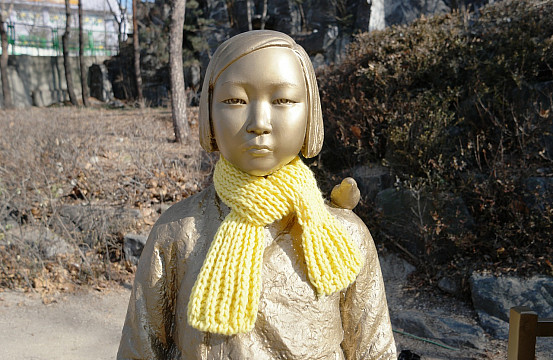 Roughly one year and one week ago , the governments of Japan and South Korea came to an agreement over the issue of Japan’s wartime sexual slavery of Korean women — known euphemistically as the “comfort women.” Per the agreement, Japan apologized and agree to contribute 1 billion yen (approximately $8.3 million at the time) to set up a foundation under the South Korean government to support the living victims.
Roughly one year and one week ago , the governments of Japan and South Korea came to an agreement over the issue of Japan’s wartime sexual slavery of Korean women — known euphemistically as the “comfort women.” Per the agreement, Japan apologized and agree to contribute 1 billion yen (approximately $8.3 million at the time) to set up a foundation under the South Korean government to support the living victims.
Though the governments of now-impeached South Korean President Park Geun-hye and Japanese Prime Minister Shinzo Abe thought the deal sufficient at the time to move the 50-year-old bilateral relationship past this decades-old dispute, public opinion was another matter. In Japan, conservatives on Abe’s right condemned the agreement as unnecessary given previous Japanese expressions of remorse and, more significantly, in South Korea, critics in the media and civil society described the deal as Park effectively selling out the dignity of survivors of wartime sexual slavery for short-term diplomatic and geopolitical gain. (A rising North Korean threat and mutual concerns over China were factors that led to the agreement becoming opportune in the first place.)
This week showed that the premature conclusion of an agreement on the issue without public support, especially in South Korea, may doom the 2015 “comfort women” deal to unravel. On Friday, Tokyo recalled its ambassador to South Korea, Yasumasa Nagamine, in protest of a statue commemorating the “comfort women” outside the Japanese Consulate in Busan. Yasuhiro Morimoto, the consul general in Busan, was also recalled “temporarily,” according to a spokesperson for Japan’s Ministry of Foreign Affairs. Japan had recalled its envoy to South Korea in 2012 when then-South Korean President Lee Myung-bak visited the disputed Dokdo/Takeshima islets in the Sea of Japan.






